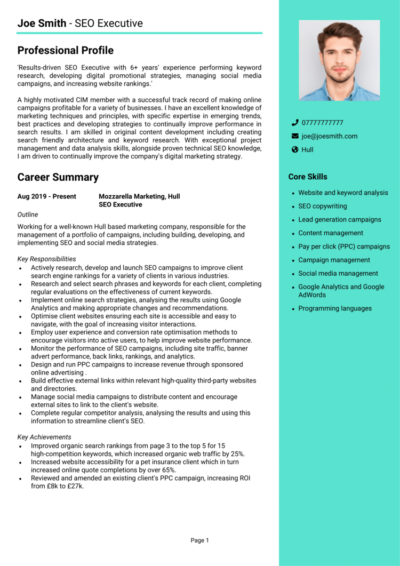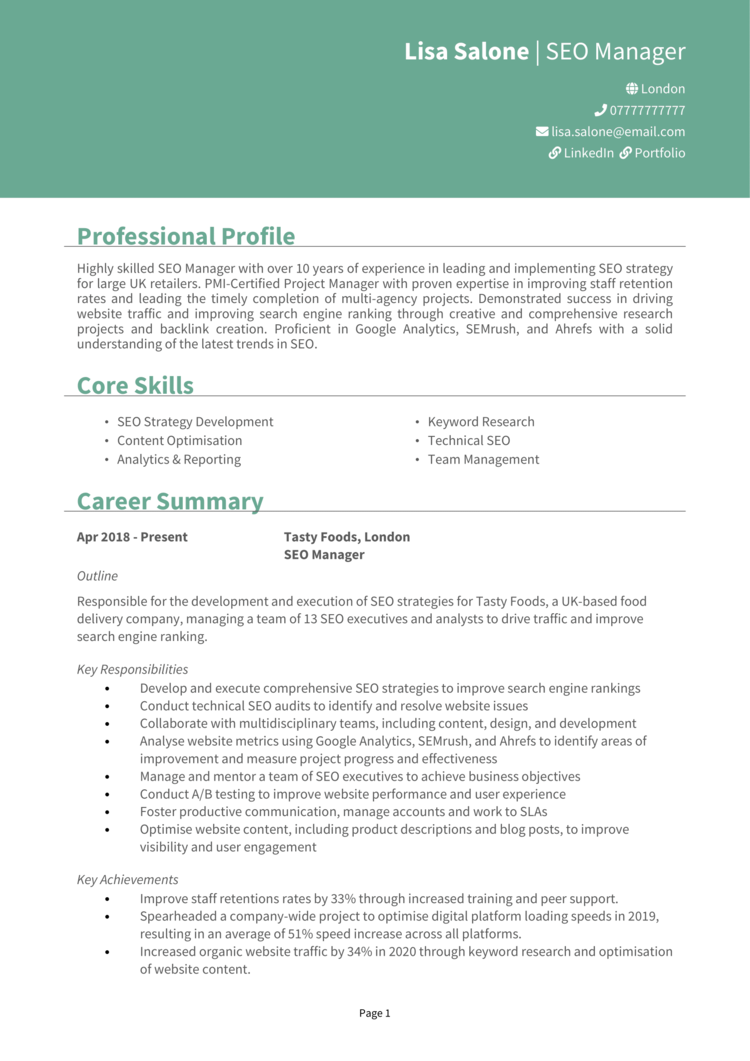The marketing industry offers plenty of exciting and creative career opportunities; in particular, a career in SEO (Search engine optimisation) can be very rewarding.
However, SEO executive positions can be competitive and your CV needs to stand out if you hope to secure an interview.
To help you out, we’ve put together 2 examples of an SEO executive CV below, offering our top tips on how you can perfect your application.
|
SEO Executive CV example

SEO Manager CV example
Unsure of what your SEO (search engine optimisation) Executive CV should look like?
Take a good look at the CV example above to get familiar with the structure, layout and format of a professional CV.
As you can see, it provides plenty of relevant information about the applicant but is still very easy to read, which will please busy recruiters.
SEO Executive CV structure and format
Recruiters are busy, and if they can’t find the information they’re looking for in a flash, it could be game over for your application.
You need to format and structure your CV in a way which allows the reader to pick out your key information with ease, even if they’re strapped for time.
It should be clear, easily legible, well-organised and scannable – check out some simple tips and tricks below:
Formatting Tips
- Length: Two sides of A4 makes for the perfect CV length, though one page is okay for less experienced applicants. This forces you to make sure that every single sentence adds value to your CV and ensures you avoid waffle.
- Readability: Make sure your CV is easy to read and looks professional by applying some simple formatting tricks. Bullet points are great for making large paragraphs more digestible, while formatting your headings with bold or coloured text will help the reader to find the information they need, with speed.
- Design: Don’t waste time adding fancy designs to your CV. It generally adds no value to your application and may even end up distracting recruiters away from the important written content.
- Avoid photos: If your CV has photos, images or profile pictures, hit the delete button. They’re not needed and won’t add any value to your applications.


Structuring your CV
When writing your CV, break up the content into the following key sections, to ensure it can be easily digested by busy recruiters and hiring managers:
- Contact details – Always list these at the very top of your CV – you don’t want them to be missed!
- Profile – An introductory paragraph, intended to grab recruiters attention and summarise your offering.
- Work experience / career history – Working from your current role and working backwards, list your relevant work experience.
- Education – Create a snappy summary of your education and qualifications.
- Interest and hobbies – An optional section to document any hobbies that demonstrate transferable skills.
Now I’ll guide you through exactly what you should include in each CV section.
CV Contact Details
Write your contact details in the top corner of your CV, so that they’re easy to find but don’t take up too much space.
You only need to list your basic details, such as:
- Mobile number
- Email address
- Location – Don’t list your full address. Your town or city, such as ‘Norwich’ or ‘Coventry’ is perfect.
- LinkedIn profile or portfolio URL – Remember to update these before listing them on an application.
SEO Executive CV Profile
Grab the reader’s attention by kick-starting your CV with a powerful profile (or personal statement, if you’re a junior applicant).
This is a short introduction paragraph which summarises your skills, knowledge and experience.
It should paint you as the perfect match for the job description and entice recruiters to read through the rest of your CV.
Tips for creating an impactful CV profile:
- Keep it brief: It might be tempting to submit a page-long CV profile, but recruiters won’t have the time to read it. To ensure every word gets read, it’s best to include high-level information only; sticking to a length of 3-5 lines.
- Tailor it: The biggest CV mistake? A generic, mass-produced document which is sent out to tens of employers. If you want to land an interview, you need to tailor your CV profile (and your application as a whole) to the specific roles you’re applying for. So, before you start writing, remember to read over those job descriptions and make a list of the skills, knowledge and experience the employers are looking for.
- Don’t add an objective: Leave your career objectives or goals out of your profile. You only have limited space to work with, so they’re best suited to your cover letter.
- Avoid cliches: Cheesy clichès and generic phrases won’t impress recruiters, who read the same statements several times per day. Impress them with your skill-set, experience and accomplishments instead!
What to include in your SEO Executive CV profile?
- Summary of experience: Start with a brief summary of your relevant experience so far. How many years experience do you have? What type of companies have you worked for? What industries/sectors have you worked in? What are your specialisms? (e.g. ecommerce SEO, SaaS SEO etc.)
- Relevant skills: Employers need to know what skills you can bring to their organisation, and ideally they want to see skills that match their job vacancy. So, research your target roles thoroughly and add the most important SEO Executive skills to your profile.
- Essential qualifications: If the jobs you are applying to require candidates to have certain qualifications, then you must add them in your profile to ensure they are seen by hiring managers.
Quick tip: Your CV is your first impression on recruiters, so it’s vital to avoid spelling and grammar mistakes if you want to appear professional. Use our quick-and-easy CV Builder to add pre-written content that has been crafted by recruitment experts.
Core skills section
Underneath your profile, create a core skills section to make your most relevant skills jump off the page at readers.
It should be made up of 2-3 columns of bullet points of your relevant skills.
Before you do this, look over the job description and make a list of any specific skills, specialisms or knowledge required.
Then, make sure to use your findings in your list. This will paint you as the perfect match for the role.


Work experience/Career history
Next up is your work experience section, which is normally the longest part of your CV.
Start with your current (or most recent) job and work your way backwards through your experience.
Can’t fit all your roles? Allow more space for your recent career history and shorten down descriptions for your older roles.
Structuring your roles
If you don’t pay attention to the structure of your career history section, it could quickly become bulky and overwhelming.
Get in recruiters’ good books by creating a pleasant reading experience, using the 3-step structure below:
Outline
Start with a brief summary of your role as a whole, as well as the type of company you worked for.
Key responsibilities
Using easy-to-read bullet points, note down your day-to-day responsibilities in the role.
Make sure to showcase how you used your hard sector skills and knowledge.
Key achievements
Lastly, add impact by highlight 1-3 key achievements that you made within the role.
Struggling to think of an achievement? If it had a positive impact on your company, it counts.
For example, you might increased company profits, improved processes, or something simpler, such as going above and beyond to solve a customer’s problem.
Education
In your education section, make any degrees, qualifications or training which are relevant to SEO Executive roles a focal point.
As well as mentioning the name of the organisation, qualification titles and dates of study, you should showcase any particularly relevant modules, assignments or projects.
Interests and hobbies
Although this is an optional section, it can be useful if your hobbies and interests will add further depth to your CV.
Interests which are related to the sector you are applying to, or which show transferable skills like leadership or teamwork, can worth listing.
On the other hand, generic hobbies like “going out with friends” won’t add any value to your application, so are best left off your CV.


Essential skills for your SEO Executive CV
Tailoring your CV to the roles you are applying for is key to success, so make sure to read through the job descriptions and tailor your skills accordingly.
However, commonly desired SEO skills include:
SEO skills: You must possess the key technical skills and knowledge of SEO, such as keyword research and link building
Adaptability: The rules of SEO are always evolving and you need to be able to adapt to these changes and stay ahead of the latest trends
Analytics: A huge part of the role is analysing rankings and looking at data to determine which strategies are and aren’t working
Communication skills: Speaking and listening are crucial skills but in particular, being able to write great content is important in an SEO role
Problem-solving: You will often be required to investigate data and look at trends in order to solve problems such as poor rankings
Writing your SEO Executive CV
A strong, compelling CV is essential to get noticed and land interviews with the best employers.
To ensure your CV stands out from the competition, make sure to tailor it to your target role and pack it with sector-specific skills and results.
Remember to triple-check for spelling and grammar errors before hitting send.
Good luck with the job search!











